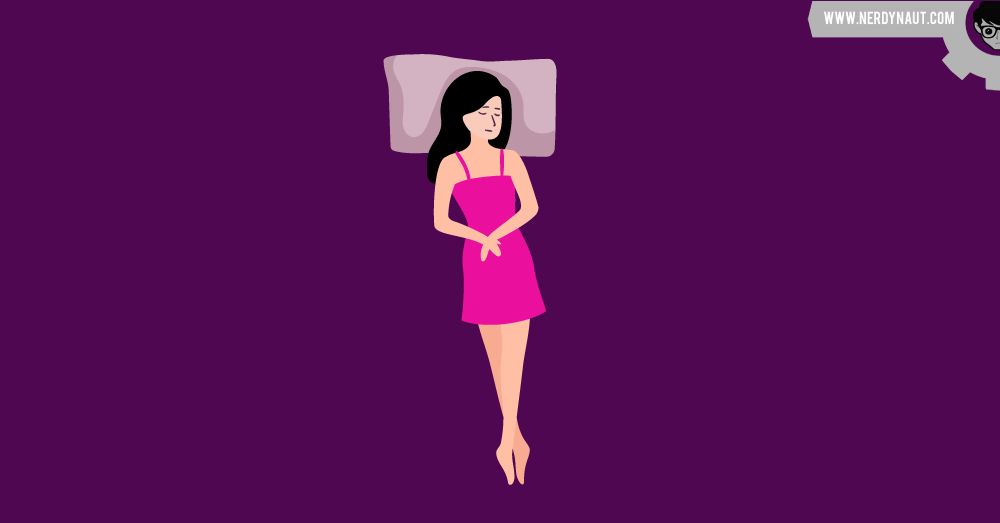Imagine this.
You’re sleeping alone in your bed, tucked safely underneath your covers. Everything seems ordinarily fine until you feel your body start becoming this heavy, big mass. You feel locked in your position and for some weird reason unbeknownst to you, it’s difficult to move even the tiniest of your finger. You feel like you’re in prison, except the jail bars are now right above your body, blocking you from breaking free.
You feel like you’re about to die. “Why can’t I move?” you think to yourself.
All of the sudden, the panic sets in and pure, white-knuckled fear kicks in your system, turning your body cold quickly. In your peripheral vision, you could make out the dark looming shadow of a man, inching closer to your body. You still can’t move! Tears start dripping down your face, you desperately try to recollect any prayer verses to calm yourself. Seconds, that feels like an eternity, pass, and the man is coming closer. Dizziness takes over. Your heart starts pounding crazily. It could almost explode out of your chest right now. Then, boom! electricity goes back into your body and suddenly you’re awake!
You find yourself in a cold sweat, tears streaming down your face, frantically looking around the room to find nobody– not a single being present other than yourself. Still shocked about the ordeal, you end up wide-awake, limp body resting against the wall while thinking to yourself, “What on Earth did I just experience?”
That, my readers, is the classic interpretation of sleep paralysis. Or rather, my experience of being in a sleep paralysis once in my college dorm, during a hot summer’s night back in 2015. 4 years on and the memories is still so vivid in my mind, almost as if I’m unable to accept and forget the whole ordeal.
It haunted me back then and still makes me curious up to this day. What actually happened? Or more importantly, why did it happen to me?
What could I have done to trigger this incident?
In order to make sense of the situation, I took to the books and spent days researching about sleep paralysis. What I found truly shocked me to the core. Over 5% to a whopping 60% of people experience some form of sleep paralysis due to a disturbance in the Rapid Eye Movement (REM) sleep cycle, amongst a multitude of other factors. However, everyone had a truly different experience. Some experienced a heavy figure alike a succubus or incubus atop their torsos, many heard distant noises such as their wardrobe or bedroom door opening slowly, some even had a dark figure of a man or a woman with black, long hair brushing against the floor, walking towards them. Some even had sleep paralyses within their sleep paralysis and have seen their own bodies asleep in bed while having an out-of-body experience. Some stories sound crazy but then again, so does mine and I know for a fact that I was not making this up.
As research goes, many people experience this scary and frightening ordeal during their adolescence. Most sleep paralysis episodes are one-offs, such as in my case. However, if you’ve experienced a similar situation yourself numerous times, it might be best to consult a GP or a trusted family doctor. There have been hundreds of studies done in the realm of sleep paralysis and night terrors and these studies cite a few factors to be the underlying cause of sleep paralysis which includes:
- Genetic and inherited mental health issues such as Anxiety, Depression, Post-Traumatic Stress Disorders (PTSD) or panic disorders
- Lack of proper sleep (such as insomnia or sleep deprivation) and sleeping in an unhealthy, unclean or brightly-lit environment
- Jet lag, or recent shifts in the body’s sleeping schedule
- Sleeping on your back
- Narcolepsy– (a long-term condition that results in a person involuntarily falling asleep at inappropriate times)
REM sleep refers to a sleeping stage in which certain areas of the brain is in heightened mode and actively picks up on any stimulus occurring around the body, including sounds and figures. The human body alternates between the REM and NREM sleep cycle which typically lasts around 90 minutes.
Dreams occur during the REM cycle and if there is any disturbance to the body’s transition from REM sleep, sleep paralysis will usually take place. When this happens, the body and the brain is out of sync. This explains why we feel paralysed as the mutual symptom in a sleep paralysis episode.
It doesn’t affect a person’s breathing capabilities, however. There is no denying that the incidents that take place during a sleep paralysis episode can be extremely traumatic and lead to anxiety over it happening again. As scary as it can be, there is no serious medical risk tied to this occurrence.
Due to the highly controversial subject nature of sleep paralysis that does not discriminate between religions, races, cultures, traditions or any creed, many are convinced that sleep paralysis is actually of supernatural origins. People with more analytical thinking styles tend to dissociate sleep paralysis with supernatural beliefs and were reportedly less traumatised after the incidents which is the opposite for people who hold supernatural beliefs and experienced sleep paralysis before in their lives. Although there is no distinct causal relationship, intuitive thinkers generally move toward supernatural beliefs to justify the occurrence while analytical thinkers are more drawn towards making a plausible, and just scientific explanation behind the episodes.
Wrapping up…
Regardless of whether you are an analytical or intuitive thinker, having gone through a sleep paralysis episode is a daunting task. Oftentimes perceived to be more distressing and traumatic than most panic attacks, the choice is in your hands to get back up or let it affect you. Either way, you are stronger than you know and I hope, that’s the most important takeaway of this.

